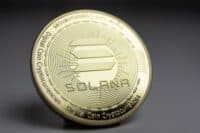
In the first half-hour of Wednesday morning trading, the Dow Jones industrials were up 0.1%, the S&P 500 up 0.13% and the Nasdaq 0.73% higher.
After U.S. markets closed on Tuesday, Microsoft reported earnings per share (EPS) and revenue that topped Wall Street estimates. The better news is that the company expects growth going forward. Shares traded up 6.3% Wednesday morning.
Alphabet also beat top-line and bottom-line estimates and announced an additional $70 billion for its share buyback program. Shares traded essentially flat.
Enphase Energy also beat estimates on the top and bottom lines but issued downside guidance for the current quarter. Shares were slammed Wednesday morning, trading down 23.8%.
PacWest Bancorp beat both EPS and revenue estimates, and even better, deposits are improving. The stock traded up 12.4%.
Visa topped estimates on the top and bottom lines, and it was rewarded with a share price boost of 0.3% Wednesday morning.
Before markets opened on Wednesday, Boeing missed Wall Street’s profit estimate but beat on revenue. The aerospace giant reaffirmed prior operating cash flow guidance and its delivery estimate of 400 to 450 737s for 2023. Shares traded up about 2.8%.
Norfolk Southern beat estimates on both the top and bottom lines, and the stock traded down about 0.05%.
Teck Resources missed consensus EPS and revenue estimates but shares were trading a bit higher, regardless. Investors may be thinking that the company may now look more favorably at a buyout offer from commodity trading giant Glencore. The company is looking for a simple way to split off its coal business. Shares traded up 4.8%.
After markets close on Wednesday, Antero Resources, EQT and Meta Platforms are scheduled to report results. The following morning, AbbVie, Altria, American Airlines and Merck share their results, as do Caterpillar, Newmont and Peabody Energy.
Here are previews of four companies set to report results later on Thursday.
Amazon
Since falling to a new 52-week in the first week of 2023, shares of Amazon.com Inc. (NASDAQ: AMZN) have added more than 22%. Over the past 12 months, however, shares are down nearly 30%. Like other big tech companies, Amazon is cutting jobs as it seeks to get costs under control and margins back up. But the e-commerce and cloud computing giant needs to show revenue growth and provide an outlook that sustains growth for the rest of the year.
Analysts remain strongly bullish on Amazon stock. Of 50 ratings, 46 are Buy or Strong Buy, and three others are at Hold. At a recent price of around $102.50 a share, the upside potential based on a median price target of $135.00 is 31.7%. At the high price target of $220.00, the upside potential is nearly 115%.
Analysts are looking for first-quarter revenue of $124.57 billion, which would be down 16.5% sequentially but up 7% year over year. Adjusted EPS are expected to be $0.22, up from three cents in the prior quarter and up from a loss per share of $0.38 in the year-ago quarter. For the full 2023 fiscal year, Amazon is expected to post EPS of $1.43, compared to last year’s loss of $0.27 per share, on sales of $557.02 billion, up 8.4%.
Amazon stock trades at 71.7 times expected 2023 EPS, 40.9 times estimated 2024 earnings of $2.51 and 28.9 times estimated 2025 earnings of $3.55 per share. The stock’s 52-week trading range is $81.43 to $146.57. Amazon does not pay a dividend. Total shareholder return over the past 12 months was negative 29.78%.
First Solar
Solar energy provider First Solar Inc. (NASDAQ: FSLR) has had a share price gain of 191% over the past 12 months. For the year to date, shares are up nearly 41%, and for the past six months, they are up nearly 66%. A recent analyst report that reduced the company’s rating to Sell has shaved about 4% from the share price over the past five trading sessions. First Solar issued seriously upbeat guidance, largely as a $600 million to $710 million boost from tax credits available under the Inflation Reduction Act. We are all about to see how that is working out for the company.
There are 27 analysts covering the stock, and 14 rate it at Buy or Strong Buy. Ten more have Hold ratings. At a share price of around $210.50, the implied upside on the stock at a median price target of $224.50 is 6.7%. At the high price target of $260.00, upside potential is 23.5%.
For the company’s first quarter, analysts are forecasting revenue of $716.66 million, a decrease of 28.5% sequentially but up 95.3% year over year. Adjusted EPS are expected to come in at $0.95, compared to a prior quarter loss of $0.07 and a year-ago quarterly loss of $0.42. For the full 2023 fiscal year, the revenue estimate is $3.5 billion, up 33.6%, and the EPS estimate is $7.25, compared to a year-ago loss of $2.79 per share.
First Solar stock trades at 29.0 times expected 2023 EPS, 15.8 times estimated 2024 earnings of $13.37 and 10.4 times estimated 2025 earnings of $20.33 per share. The stock’s 52-week range is $59.60 to $221.88. The company does not pay a dividend. Total shareholder return over the past 12 months was 190.59%.
Intel
Shares of Intel Corp. (NASDAQ: INTC) have dropped by more than 38% over the past 12 months. The bar is set so low for the company’s first quarter that anything other than a decent beat is likely to send shares lower.
Demand for Intel’s newest server chip, called Sapphire Rapids, reportedly has been weak, and the new PC processors due out this quarter will not be used for high-performance systems, according to other reports. Some analysts expect the company’s first-quarter results to be worse than the dreadful fourth-quarter numbers. Others think the chipmaker has at least begun to turn the corner. We do not have much longer to wait to find out.
Of 41 analysts covering the stock, just eight have a Buy or Strong Buy rating. There are 25 Hold ratings, and the rest are Sell or Strong Sell. At a share price of around $29.00, the stock trades right at its median price target. At the high target of $45.00, the implied upside is about 55.2%.
First-quarter revenue is forecast at $11.13 billion, down about 20.7% sequentially and by 39.3% year over year. Analysts are also looking for an adjusted loss per share of $0.14, down from EPS of $0.10 in the prior quarter and from EPS of $0.87 in the first quarter of 2022. For the 2023 fiscal year, Intel is expected to report EPS of $0.51, down 72.1%, on sales of $50.77 billion, down 19.5%.
Intel stock trades at 56.3 times expected 2023 EPS, 15.2 times estimated 2024 earnings of $1.90 and 10.7 times estimated 2025 earnings of $2.71 per share. The stock’s 52-week range is $24.59 to $47.27. Intel pays an annual dividend of $0.50 (yield of 1.69%). Total shareholder return over the past year is negative 35.91%.
T-Mobile
T-Mobile US Inc. (NASDAQ: TMUS) posted its 52-week high in early November, just a few days after releasing its third-quarter results. That was also the stock’s all-time high. Since then, the stock has retreated about 1.5%.
The mobile carrier introduced new subscriber plans last week that appear to offer limited improvements over customers’ current choices. Could that indicate that T-Mobile has little left up its sleeve to keep growth on track? The U.S. Department of Veterans Affairs on Tuesday named T-Mobile as its primary wireless provider, which is expected to add about 50,000 wireless lines to the company’s network.
Analysts are solidly bullish on the stock, with 27 of 31 having a Buy or Strong Buy rating and three more with Hold ratings. At a share price of around $148.00, the implied gain based on a median price target of $175.00 is about 18.2%. At the high target of $225.00, the implied gain is 52%.
First-quarter revenue is forecast at $19.82 billion, down 2.2% sequentially and 1.5% lower year over year. Adjusted EPS are pegged at $1.48, down 7% sequentially but up 5% year over year. For the full 2023 fiscal year, analysts have forecast EPS of $7.15, up 7.1%, on sales of $80.55 billion, up 1.2%.
T-Mobile stock trades at 20.7 times expected 2023 EPS, 14.9 times estimated 2024 earnings of $9.96 and 11.6 times estimated 2025 earnings of $12.72 per share. The stock’s 52-week range is $120.90 to $154.38. The company does not pay a dividend, and total shareholder return for the past 12 months was 14.9%.
Thank you for reading! Have some feedback for us?
Contact the 24/7 Wall St. editorial team.
 24/7 Wall St.
24/7 Wall St. 24/7 Wall St.
24/7 Wall St.


